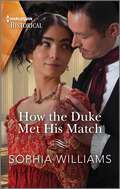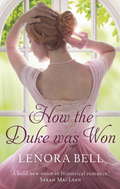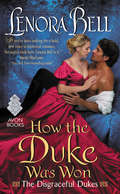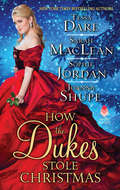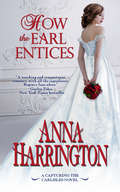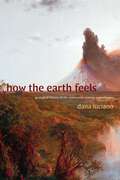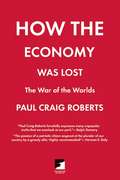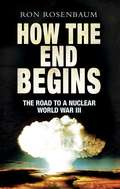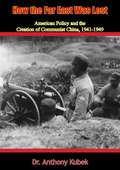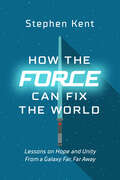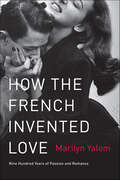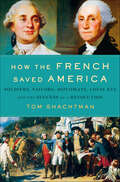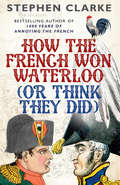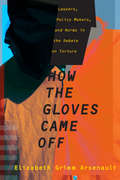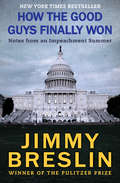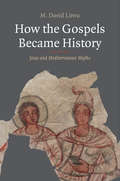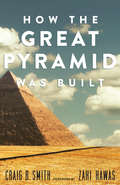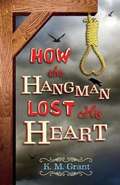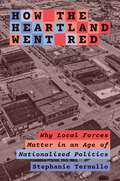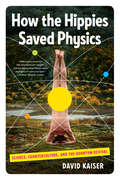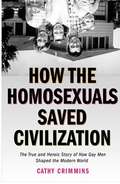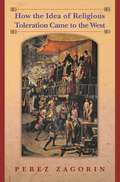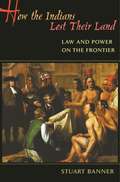- Table View
- List View
How the Duke Met His Match
by Sophia WilliamsA Regency romance full of wit and charmPropose in hasteRepent at leisure? Alexander, Duke of Harwell, couldn&’t stand by and let a rogue ruin heiress Emma. To save her reputation, he shocks himself by announcing their engagement! But the widower doesn&’t want to remarry, and independent Emma is equally displeased, even if a paper marriage is the only solution. Yet as Emma bonds with his young sons, filling their home with warmth again, dormant feelings stir in Alex and he wonders if he&’s met his match… From Harlequin Historical: Your romantic escape to the past.
How the Duke Was Won (The Disgraceful Dukes #1)
by Lenora Bell'A debut that reads like an instant classic. Message to my readers: You'll love Lenora Bell!' Eloisa James, New York Times bestselling authorThe pleasure of your company is requested at Warbury Park. Four lovely ladies will arrive . . . but only one can become a duchess.James, the scandalously uncivilized Duke of Harland, requires a bride with a spotless reputation for a strictly business arrangement. Lust is prohibited and love is out of the question.Four ladies. Three days. What could go wrong?She is not like the others . . . Charlene Beckett, the unacknowledged daughter of an earl and a courtesan, has just been offered a life-altering fortune to pose as her half-sister, Lady Dorothea, and win the duke's proposal. All she must do is:* Be the perfect English rose (Ha!)* Breathe, smile, and curtsy in impossibly tight gowns (blast Lady Dorothea's sylph-like figure)* Charm and seduce a wild duke (without appearing to try)* Keep said duke far, far from her heart (no matter how tempting)When secrets are revealed and passion overwhelms, James must decide if the last lady he should want is really everything he needs. And Charlene must decide if the promise of a new life is worth risking everything . . . including her heart.'How the Duke was Won is exciting and emotional - evocative of the best of the genre. If you've been looking for a bold, new voice in historical romance, the search ends here. Lenora Bell is it!' Sarah MacLean'Fresh, flirty, and fabulous! The new Belle of Historical Romance!' Kerrelyn Sparks
How the Duke Was Won: The Disgraceful Dukes
by Lenora BellThe pleasure of your company is requested at Warbury Park. Four lovely ladies will arrive... but only one can become a duchess.James, the scandalously uncivilized Duke of Harland, requires a bride with a spotless reputation for a strictly business arrangement. Lust is prohibited and love is out of the question.Four ladies. Three days. What could go wrong?She is not like the others...Charlene Beckett, the unacknowledged daughter of an earl and a courtesan, has just been offered a life-altering fortune to pose as her half-sister, Lady Dorothea, and win the duke's proposal. All she must do is:* Be the perfect English rose [Ha!]* Breathe, smile, and curtsy in impossibly tight gowns [blast Lady Dorothea's sylph-like figure]* Charm and seduce a wild duke [without appearing to try]* Keep said duke far, far from her heart [no matter how tempting]When secrets are revealed and passion overwhelms, James must decide if the last lady he should want is really everything he needs. And Charlene must decide if the promise of a new life is worth risking everything . . . including her heart.
How the Duke Was Won: The Disgraceful Dukes
by Lenora BellThe pleasure of your company is requested at Warbury Park. Four lovely ladies will arrive… but only one can become a duchess.James, the scandalously uncivilized Duke of Harland, requires a bride with a spotless reputation for a strictly business arrangement. Lust is prohibited and love is out of the question.Four ladies. Three days. What could go wrong?She is not like the others…Charlene Beckett, the unacknowledged daughter of an earl and a courtesan, has just been offered a life-altering fortune to pose as her half-sister, Lady Dorothea, and win the duke’s proposal. All she must do is:* Be the perfect English rose [Ha!]* Breathe, smile, and curtsy in impossibly tight gowns [blast Lady Dorothea’s sylph-like figure]* Charm and seduce a wild duke [without appearing to try]* Keep said duke far, far from her heart [no matter how tempting]When secrets are revealed and passion overwhelms, James must decide if the last lady he should want is really everything he needs. And Charlene must decide if the promise of a new life is worth risking everything . . . including her heart.
How the Dukes Stole Christmas: A Christmas Romance Anthology
by Tessa Dare Sophie Jordan Joanna Shupe Sarah MacLeanFrom the ballrooms of London, to abandoned Scottish castles, to the snowy streets of Gilded Age New York, four bestselling authors whip up unforgettable Christmas romance.“Meet Me in Mayfair” by Tessa DareLouisa Ward needs a Christmas miracle. Unless she catches a wealthy husband at the ball, the Duke of Thorndale will evict her family from their home. When Louisa finds herself waltzing with the heartless Thorndale, she’s unnerved by his handsome looks—and surprising charm.“The Duke of Christmas Present” by Sarah MacLean Rich and ruthless, Eben, Duke of Allryd doesn’t care for the holidays. But when Lady Jacqueline Mosby returns to town after a long absence, Eben falls under the spell of Christmas—and the woman he never stopped loving. “Heiress Alone” by Sophie Jordan When Annis Bannister finds herself stranded in the Highlands during a Christmas snowstorm, she must fend off brigands terrorizing the countryside. Her only hope falls on her neighbor, a surly hermit duke who unravels her with a kiss. “Christmas in Central Park” by Joanna ShupeMrs. Rose Walker pens a popular advice/recipe column. No one knows Rose can’t even boil water. When her boss, Duke Havemeyer, insists she host a Christmas party, Rose must find a husband, an empty mansion, and a cook. But Rose fears her plan is failing—especially when Duke’s attentions make her want to step under the mistletoe with him.
How the Earl Entices (Capturing the Carlisles #4)
by Anna HarringtonWHEN OLD DECEPTIONS LEAD TO NEW DESIRESRoss Carlisle, Earl of Spalding, has dedicated his life to serving his country. When he discovers secrets that could endanger England, he’s forced into an impossible situation—commit treason and race to London to clear his name before the crown turns against him. He’s prepared to abandon everything he possesses in order to protect England, including his life…until he crosses paths with a woman who’s keeping her own secrets.Ten years ago, Grace Alden fled the only life she’d ever known in order to protect her son, only to come face-to-face with that past when Ross collapses on her doorstep. They strike a deal—she’ll help him travel to London if he helps her reclaim her son’s inheritance. But as old deceptions turn into new desires, will they be willing to sacrifice everything they hold dear in order to protect the people they love?
How the Earth Feels: Geological Fantasy in the Nineteenth-Century United States (ANIMA: Critical Race Studies Otherwise)
by Dana LucianoIn How the Earth Feels Dana Luciano examines the impacts of the new science of geology on nineteenth-century US culture. Drawing on early geological writings, Indigenous and settler accounts of earthquakes, African American antislavery literature, and other works, Luciano reveals how geology catalyzed transformative conversations regarding the intersections between humans and the nonhuman world. She shows that understanding the earth’s history geologically involved confronting the dynamic nature of inorganic matter over vast spans of time, challenging preconceived notions of human agency. Nineteenth-century Americans came to terms with these changes through a fusion of fact and imagination that Luciano calls geological fantasy. Geological fantasy transformed the science into a sensory experience, sponsoring affective and even erotic connections to the matter of the earth. At the same time, it was often used to justify accounts of evolution that posited a modern, civilized, and Anglo-American whiteness as the pinnacle of human development. By tracing geology’s relationship with biopower, Luciano illuminates how imagined connections with the earth shaped American dynamics of power, race, and colonization.
How the Economy Was Lost: The War of the Worlds
by Paul Craig RobertsAn outline of how the economy works by an insider-turned-outsider. Roberts breaks down how our recent recession came about, how deep it will get, and how we can avoid one in the future.
How the End Begins: The Road to a Nuclear World War III
by Ron RosenbaumEach chapter of the How the World Ends deconstructs the dangers we face. Rosenbaum begins by showing all the ways the post-Cold War order that tried to impose a set of rules of averting a nuclear mistake has fallen apart. In chapter 2, he describes the journey of one Bruce Blair, once a missile launcher, whose experience inside the nuclear establishment left him alarmed about its vulnerabilities. Chapter 3 looks at nuclear war from the Russian side, using the architect of that nation's early warning system as a focus. Chapter 4 looks at how the Bush Administration helped pushed the world closer to a nuclear conflict by rewriting the rules of deterrence. Chapter 5 describes all the ways the international incidents we have seen - Georgia, the Israeli raid on Syria, the Iranian moves - are evidence that some governments have shown a willingness to move closer to the brink of a conflict involving nuclear weapons. The rest of the book looks at the broader nuclear issues facing the world in the 21st century: What is deterrence? Who can claim to have it? How many nuclear weapons can we live with? Is zero really possible? In other words: Can we undream the nightmare?
How the Far East Was Lost: American Policy and the Creation of Communist China, 1941-1949
by Dr Anthony KubekThe Far Eastern policy pursued during the Roosevelt-Truman administrations has long been the subject of spirited controversy among historians. This volume, first published in 1963, is the result of seven years of intensive research into a mass of documentary data dealing with the Communist conquest of China.“Professor Kubek discusses with unusual candor and clear vision the many mistakes of the Roosevelt and Truman Administrations with reference to the Far East. There are new data and fresh interpretations that lend additional evidence to support the contentions of earlier writers that the diplomacy of the Administrations of Roosevelt and Truman was disastrous in the extreme. The strange actions of General Marshall in China, and his blind policy while Secretary of State, were chief factors in the loss of China to the Communists. In a noteworthy chapter that all Americans should read, Professor Kubek traces in damning detail the tragic role that Marshall played in the fall of Nationalist China.“This is a volume that will earn the sharpest criticisms of the motley hordes that crowded the Roosevelt and Truman bandwagons, but it is a must book for any American who wants to know why the present sawdust Caesar, Khrushchev, can insult at will the President of the United States and can hurl continual threats to “bury” all Americans. Soviet militate might is the direct product of billions of Democratic Lend-Lease aid, coddling of Communists in high places in the American Government, and failure to understand the basic drives of world Communism. Never before in our history was Presidential leadership so devoid of vision, and never before had the mistakes of our Chief Executives been so fraught with peril to our nation. Read this book and then begin to worry about how Americans will fare in the next decade.”—Charles Callan Tansill, Professor Emeritus of Diplomatic History, Georgetown University (Foreword)
How the Financial Crisis Affects Pensions and Insurance and Why the Impacts Matter
by Gregorio Impavido Ian TowerA report from the International Monetary Fund.
How the Force Can Fix the World: Lessons on Life, Liberty, and Happiness from a Galaxy Far, Far Away
by Stephen KentFrom widespread unemployment and mounting international hostilities, every day we are swept into more political chaos—so one brave man looks to the Star Wars universe for answers to our most urgent problems.&“You can&’t stop the change — anymore than you can stop the sun from setting.&” Anakin Skywalker was never able to live with this wisdom shared by his mother on the day he left home to train as a Jedi Knight. That failure led him to becoming the fearsome villain we all know as Darth Vader. We&’re living in a time of unprecedented and rapid change. An age of chaos. Democracies are in decline worldwide. Dictators are ascendant. Civic organizations are crumbling. People feel lonelier and more rudderless than in any other time in recent history. We&’ve tried to slow down, and in some cases we, like Anakin, have tried stop the change, but failed at every turn. The fears that come with living in an age of disruption have produced public anger, and that anger has swelled movements of hate. Author Stephen Kent believes part of the solution is hiding in plain sight. A story that binds together multiple generations with a common language, a moral framework, and a sense of wonder. It&’s Star Wars. What if we looked to Star Wars for more than just entertainment? How the Force Can Fix the World takes this challenge on by analyzing the core principles of the Star Wars franchise: HOPE, CHOICE, HUMILITY, EMPATHY, REDEMPTION, BALANCE and rejecting FEAR. Together, these are the Star Wars roadmap for living better lives, and maybe even fostering a better politics. The path that we&’re on — where fear leads to anger, and anger to hatred — will only end in suffering. But Star Wars shows us the way back from the brink. Shared stories of virtue that are beloved across cultures and political divides are hard to come by, but Star Wars is one such story. Turn on the news; things are pretty broken right now — but the Force can fix the world.
How the French Invented Love: Nine Hundred Years of Passion and Romance
by Marilyn Yalom“Absolutely marvelous…lively and learned….Marilyn Yalom’s book is a distinguished contribution to our experience of a great literature, as well as an endearing memoir.” —Diane Johnson, author of Lulu in Marrakech and Le Divorce“[An] enchanting tour of French literature—from Abelard and Heloise in the 12th century to Marguerite Duras in the 20th and Philippe Sollers in the 21st.” —Publishers Weekly (starred review)How the French Invented Love is an entertaining and masterful history of love à la française by acclaimed scholar Marilyn Yalom. Spanning the Middle Ages to the present, Yalom explores a love-obsessed culture through its great works of literature—from Moliere’s comic love to the tragic love of Racine, from the existential love of Simone de Beauvoir and Jean-Paul Sartre to the romanticism of George Sand and Alfred de Musset. A thoroughly engaging homage to French culture and literature interlaced with the author’s delicious personal anecdotes, How the French Invented Love is ideal for fans of Alain de Botton, Adam Gopnik, and Simon Schama.
How the French Saved America: Soldiers, Sailors, Diplomats, Louis XVI, and the Success of a Revolution
by Tom ShachtmanAmericans today have a love/hate relationship with France, but in How the French Saved America Tom Shachtman shows that without France, there might not be a United States of America.To the rebelling colonies, French assistance made the difference between looming defeat and eventual triumph. Even before the Declaration of Independence was issued, King Louis XVI and French foreign minister Vergennes were aiding the rebels. After the Declaration, that assistance broadened to include wages for our troops; guns, cannon, and ammunition; engineering expertise that enabled victories and prevented defeats; diplomatic recognition; safe havens for privateers; battlefield leadership by veteran officers; and the army and fleet that made possible the Franco-American victory at Yorktown. Nearly ten percent of those who fought and died for the American cause were French. Those who fought and survived, in addition to the well-known Lafayette and Rochambeau, include François de Fleury, who won a Congressional Medal for valor, Louis Duportail, who founded the Army Corps of Engineers, and Admiral de Grasse, whose sea victory sealed the fate of Yorktown. This illuminating narrative history vividly captures the outsize characters of our European brothers, their battlefield and diplomatic bonds and clashes with Americans, and the monumental role they played in America’s fight for independence and democracy.
How the French Won Waterloo - or Think They Did
by Stephen ClarkePublished in the 200th Anniversary year of the Battle of Waterloo a witty look at how the French still think they won, by Stephen Clarke, author of 1000 Years of Annoying the French and A Year in the Merde.Two centuries after the Battle of Waterloo, the French are still in denial.If Napoleon lost on 18 June 1815 (and that's a big 'if'), then whoever rules the universe got it wrong. As soon as the cannons stopped firing, French historians began re-writing history. The Duke of Wellington was beaten, they say, and then the Prussians jumped into the boxing ring, breaking all the rules of battle. In essence, the French cannot bear the idea that Napoleon, their greatest-ever national hero, was in any way a loser. Especially not against the traditional enemy – les Anglais.Stephen Clarke has studied the French version of Waterloo, as told by battle veterans, novelists, historians – right up to today's politicians, and he has uncovered a story of pain, patriotism and sheer perversion ...
How the Gloves Came Off: Lawyers, Policy Makers, and Norms in the Debate on Torture (Columbia Studies in Terrorism and Irregular Warfare)
by Elizabeth Grimm ArsenaultThe treatment of detainees at Abu Ghraib prison, Guantánamo Bay, and far-flung CIA "black sites" after the attacks of 9/11 included cruelty that defied legal and normative prohibitions in U.S. and international law. The antitorture stance of the United States was brushed aside. Since then, the guarantee of American civil liberties and due process for POWs and detainees has grown muddled, threatening the norms that sustain modern democracies. How the Gloves Came Off considers the legal and political arguments that led to this standoff between civility and chaos and their significant consequences for the strategic interests and standing of the United States. Unpacking the rhetoric surrounding the push for unitary executive action in wartime, How the Gloves Came Off traces the unmaking of the consensus against torture. It implicates U.S. military commanders, high-level government administrators, lawyers, and policy makers from both parties, exposing the ease with which powerful actors manipulated ambiguities to strip detainees of their humanity. By targeting the language and logic that made torture thinkable, this book shows how future decision makers can craft an effective counternarrative and set a new course for U.S. policy toward POWs and detainees. Whether leaders use their influence to reinforce a prohibition of cruelty to prisoners or continue to undermine long-standing international law will determine whether the United States retains a core component of its founding identity.
How the Good Guys Finally Won: Notes from an Impeachment Summer
by Jimmy BreslinAfter the Watergate scandal corrupted American democracy, it took a gang of honest politicians to restore honorNot long after burglars were caught raiding the Democratic National Committee headquarters at the Watergate Hotel, Congressman Tip O'Neill noticed that Democratic fundraising efforts for the 1972 election had stalled. Major contributors were under IRS investigation, and Republican lackeys were threatening further trouble if those donors didn't close their checkbooks. O'Neill sensed a conspiracy coming from the Nixon administration, but it wasn't until the scandal broke that he connected the threatened donors with the Watergate burglary. In the boldest move of his career, he did something that would shock the nation: O'Neill decided to impeach the President. To his fellow members of the House of Representatives, this was an ugly idea. But as evidence mounted against Nixon and his cronies, O'Neill led the charge against the President. This blow-by-blow, conviction-by-conviction account is a gripping reminder of how O'Neill and his colleagues brought justice to those who abused their power, and revived America after the greatest political scandal in its history. This ebook features an illustrated biography of Jimmy Breslin including rare photos and never-before-seen documents from the author's personal collection.
How the Gospels Became History: Jesus and Mediterranean Myths (Synkrisis)
by M. David LitwaA compelling comparison of the gospels and Greco-Roman mythology which shows that the gospels were not perceived as myths, but as historical records Did the early Christians believe their myths? Like most ancient—and modern—people, early Christians made efforts to present their myths in the most believable ways. In this eye-opening work, M. David Litwa explores how and why what later became the four canonical gospels take on a historical cast that remains vitally important for many Christians today. Offering an in-depth comparison with other Greco-Roman stories that have been shaped to seem like history, Litwa shows how the evangelists responded to the pressures of Greco-Roman literary culture by using well-known historiographical tropes such as the mention of famous rulers and kings, geographical notices, the introduction of eyewitnesses, vivid presentation, alternative reports, and so on. In this way, the evangelists deliberately shaped myths about Jesus into historical discourse to maximize their believability for ancient audiences.
How the Great Pyramid Was Built
by Craig B. Smith Zawi Hawass Mark LehnerGoing beyond even the expertise of archaeologists and historians, world-class engineer Craig B. Smith explores the planning and engineering behind the incredible Great Pyramid of Giza. How would the ancient Egyptians have developed their building plans, devised work schedules, managed laborers, solved specific design and engineering problems, or even improvised on the job? The answers are here, along with dazzling, one-of-a-kind color photographs and beautiful hand-drawn illustrations of tools, materials, and building techniques the ancient masters used. In his foreword to the book, Egypt's Undersecretary of State for the Giza Monuments Zahi Hawass explains the importance of understanding the Great Pyramid as a straightforward construction project.
How the Hangman Lost His Heart
by K. M. GrantWhat's a nice girl like Alice doing with a hangman called Dan Skinslicer? He likes a good clean killing and a hearty supper afterwards. She likes pretty dresses and riding a well-bred horse. But fate throws them together on a mission of mercy -- to save Alice's poor uncle Frank's head and restore his dignity. Soon they find themselves on the run from every soldier in London. It could be their necks next!
How the Heartland Went Red: Why Local Forces Matter in an Age of Nationalized Politics (Princeton Studies in American Politics: Historical, International, and Comparative Perspectives #212)
by Stephanie TernulloHow local contexts help us understand why White voters in America&’s heartland are shifting to the rightOver the past several decades, predominantly White, postindustrial cities in America&’s agriculture and manufacturing center have flipped from blue to red. Cities that were once part of the traditional Democratic New Deal coalition began to vote Republican, providing crucial support for the electoral victories of Republican presidents from Reagan to Trump. In How the Heartland Went Red, Stephanie Ternullo argues for the importance of place in understanding this rightward shift, showing how voters in these small Midwestern cities view national politics—whether Republican appeals to racial and religious identities or Democrat&’s appeals to class—through the lens of local conditions.Offering a comparative study of three White blue-collar Midwestern cities in the run-up to the 2020 election, Ternullo shows the ways that local contexts have sped up or slowed down White voters&’ shift to the right. One of these cities has voted overwhelmingly Republican for decades; one swung to the right in 2016 but remains closely divided between Republicans and Democrats; and one, defying current trends, remains reliably Democratic. Through extensive interviews, Ternullo traces the structural and organizational dimensions of place that frame residents&’ perceptions of political and economic developments. These place-based conditions—including the ways that local leaders define their cities&’ challenges—help prioritize residents&’ social identities, connecting them to one party over another. Despite elite polarization, fragmented media, and the nationalization of American politics, Ternullo argues, the importance of place persists—as one of many factors informing partisanship, but as a particularly important one among cross-pressured voters whose loyalties are contested.
How the Hippies Saved Physics: Science, Counterculture, and the Quantum Revival
by David Kaiser"Meticulously researched and unapologetically romantic, How the Hippies Saved Physics makes the history of science fun again."--Science In the 1970s, an eccentric group of physicists in Berkeley, California, banded together to explore the wilder side of science. Dubbing themselves the "Fundamental Fysiks Group," they pursued an audacious, speculative approach to physics, studying quantum entanglement in terms of Eastern mysticism and psychic mind reading. As David Kaiser reveals, these unlikely heroes spun modern physics in a new direction, forcing mainstream physicists to pay attention to the strange but exciting underpinnings of quantum theory.
How the Homosexuals Saved Civilization: The True and Heroic Story of How Gay Men Shaped the Modern World
by Cathy CrimminsA shrewd and irreverent cultural history of the customs, fashions, and figures of gay life in the twentieth and the early twenty-first centuries--and how they have changed all of us for the better. The "global queering" of America has been gradually shaping the way straight people talk, think, dress, and eat. Over the past fifty years, the line between what is "straight" and what is "gay" has blurred to the point that most heterosexuals are unaware of the vast contributions gay men have made to American culture. How the Homosexuals Saved Civilization presents a broad yet incisive look at how an unusual "immigrant" group, homosexual men, have become so influential on mainstream American culture. The general public's tastes and consumer choices in food, fashion, humor, literature, and body image are becoming decidedly more gay. And America has shown a real interest in TV shows with gay content and themes, such as Queer Eye for the Straight Guy; Will & Grace; and Six Feet Under. Overall, it's hip to be gay, even if you're straight. How the Homosexuals Saved Civilization tells us something about ourselves as a society. It celebrates the unique perspective of gay men and explains how essential their vitality has been to our civilization.
How the Idea of Religious Toleration Came to the West
by Perez ZagorinReligious intolerance, so terrible and deadly in its recent manifestations, is nothing new. In fact, until after the eighteenth century, Christianity was perhaps the most intolerant of all the great world religions. How Christian Europe and the West went from this extreme to their present universal belief in religious toleration is the momentous story fully told for the first time in this timely and important book by a leading historian of early modern Europe. Perez Zagorin takes readers to a time when both the Catholic Church and the main new Protestant denominations embraced a policy of endorsing religious persecution, coercing unity, and, with the state's help, mercilessly crushing dissent and heresy. This position had its roots in certain intellectual and religious traditions, which Zagorin traces before showing how out of the same traditions came the beginnings of pluralism in the West. Here we see how sixteenth- and seventeenth-century thinkers--writing from religious, theological, and philosophical perspectives--contributed far more than did political expediency or the growth of religious skepticism to advance the cause of toleration. Reading these thinkers--from Erasmus and Sir Thomas More to John Milton and John Locke, among others--Zagorin brings to light a common, if unexpected, thread: concern for the spiritual welfare of religion itself weighed more in the defense of toleration than did any secular or pragmatic arguments. His book--which ranges from England through the Netherlands, the post-1685 Huguenot Diaspora, and the American Colonies--also exposes a close connection between toleration and religious freedom. A far-reaching and incisive discussion of the major writers, thinkers, and controversies responsible for the emergence of religious tolerance in Western society--from the Enlightenment through the United Nations' Universal Declaration of Human Rights--this original and richly nuanced work constitutes an essential chapter in the intellectual history of the modern world.
How the Indians Lost Their Land: Law and Power on the Frontier
by Stuart BannerBetween the early seventeenth century and the early twentieth,nearly all the land in the United States was transferred from AmericanIndians to whites. This dramatic transformation has been understood in two very different ways--as a series of consensual transactions, but also as a process of violent conquest. Both views cannot be correct. How did Indians actually lose their land? Stuart Banner provides the first comprehensive answer. He argues that neither simple coercion nor simple consent reflects the complicated legal history of land transfers. Instead, time, place, and the balance of power between Indians and settlers decided the outcome of land struggles. As whites' power grew, they were able to establish the legal institutions and the rules by which land transactions would be made and enforced. This story of America's colonization remains a story of power, but a more complex kind of power than historians have acknowledged. It is a story in which military force was less important than the power to shape the legal framework within which land would be owned. As a result, white Americans--from eastern cities to the western frontiers--could believe they were buying land from the Indians the same way they bought land from one another. How the Indians Lost Their Land dramatically reveals how subtle changes in the law can determine the fate of a nation, and our understanding of the past.
